| Time | Session title | Stream |
|---|---|---|
Welcome to the Future Steel Forum - Day 1An introduction to the Future Steel Forum, highlighting all the key themes that will be covered over today's conference sessions. SpeakerMatthew MoggridgeEditor, Steel Times InternationalQuartz Business Media
Matthew Moggridge has been editor of Steel Times International since January 2014, having previously edited Aluminium International Today, both published by the UK-based Quartz Business Media. During his time on both titles he has travelled extensively around the world interviewing and writing about leading figures in the metals industry and covering international steel and aluminium conferences. In addition to working as a journalist in many different industrial sectors, he is also the creator and driving force behind the development of the Future Steel Forum. Matthew’s career as a business journalist has spanned many leading titles covering other industrial sectors including food processing, foodservice, foreign direct investment, bulk handling and transportation and computers. Quartz Business Media |
Conference | |
Steel Shapes a Better Future – the Swedish Iron and Steel Industry’s journey towards carbon neutralityIn 2013, the Swedish iron and steel industry launched their common vision for 2050. That was the start of hard work, engagement, and commitment that today places the Swedish steel industry in the front line of the global steel transition. The presentation will cover important milestones, opportunities and challenges of the on-going journey towards a better future. SpeakerAnnika RoosManaging DirectorSwedish Steel Association
Before joining Jernkontoret, Annika Roos headed the metal powder business unit at Sandvik, with the powder being used in processes such as additive manufacturing and metal injection molding. She has a long career and experience from many different leading positions at Sandvik, from the material technology business area (now called Alleima) as well as the metal cutting business area. Annika has an MSc in engineering physics from the Royal Institute of Technology, KTH, in Stockholm. Swedish Steel Association |
Conference | |
H2 Green Steel – the Future of Green Steelmaking |
Conference | |
Transformation to Fossil-Free Steel with the HYBRIT technologySteel is the most important material for modern society, indispensable for the production of food, drinking water, electricity, housing and infrastructure like railway, bridges, tunnels, and airports. Steel is also the most recycled material. However, growth in world steel demand can’t be satisfied only by recycling. Virgin iron ore-based steel is needed for the foreseeable future. Current production technologies of steel from iron ore rely heavily on fossil energy sources like coal and natural gas, and the steel industry accounts for approximately 7% of global CO2-emissions. SSAB, together with mining company LKAB and energy company Vattenfall, set-up the HYBRIT initiative in 2016, aiming at developing a fossil free value chain from mine to steel, thus solving the root cause of CO2-emission. Extensive research and development efforts have taken place, and in early 2022, SSAB decided to accelerate and complete the transformation to fossil-free steelmaking around 2030, 15 years ahead of the earlier target of 2045. SpeakerMartin PeiExecutive Vice President and Chief Technology OfficerSSAB/HyBrit
Martin Pei has a BSc in ferrous metallurgy from Northeastern University, Shenyang, China and a doctorate in process metallurgy from the Royal Institute of Technology, Stockholm, Sweden. Martin started his working experience in 1994 at Danieli and since 2001 he has been with SSAB, at their primary operations in Oxelösund, Sweden. Since 2007, he has served as executive vice president and chief technology officer at SSAB. During 2010 and 2014, he also served as head of SSAB Business Area APAC. Martin is the initiator of the HYBRIT initiative, a co-operation between SSAB, LKAB and Vattenfall, and served as the first-term chairman of board for Hybrit Development AB. He is currently chairman of board for SWERIM—the Swedish Research Institute of Mining, Metallurgy and Metals Research. Martin is a member of the Royal Swedish Academy for Engineering Sciences. SSAB/HyBrit |
Conference | |
Tea & Coffee Break |
Conference | |
Green Steel Supply 2025-2035This presentation will highlight the following points: classification and types of green steel, brands of green steel from leading manufacturers and their characteristics, consumers and demand for green steel, price forecast for green steel, key factors and players of the green steel market in the EU and globally. SpeakerStanislav ZinchenkoCEOGMK Center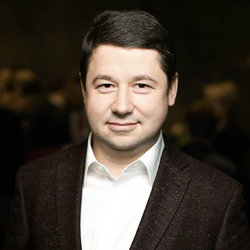
Stanislav Zinchenko is the CEO of GMK Center, chair of the Committee for Environment and Sustainable Development of the European Business Association, and president of the Council of Supply Chain Management Professionals’ Ukraine Roundtable. For the last five years, Stanislav has provided consulting services for Ukrainian iron and steel companies, specializing in sustainability issues, supply chains, CAPEX policy, and market analysis. Stanislav has 15-years of experience in consulting for manufacturing companies. He has expertise in operational management and supply chains as a team leader, consultant and analyst in international projects in the field of entrepreneurship, operational efficiency and logistics infrastructure. Stanislav has a master’s in international economics from Kyiv National Economic University. GMK Center |
Conference | |
Discussion Panel: How Do We Define Green Steel?Chaired by Rutger Gyllenram of Kobolde & Partners SpeakerThomas HörnfeldtVice President, Sustainable BusinessSSAB
Thomas Hörnfeldt is vice president of sustainable business at SSAB. He has an MBA from Uppsala University and an MSc from KTH in Stockholm, as well as vast experience in general management and sales, market intelligence, and sustainability. Thomas has been managing director of Ruukki Sverige, senior vice president of special steels and international sales at Ruukki Metals Ltd, vice president at Atlas Copco Dynapac, and vice president of corporate marketing and sales at steel provider Ovako. His career started at ABB, which he left as vice president in 2004, after almost 13 years of management positions in the metals industry activities. SSAB SpeakerFernand DidelonConsultant in Steel DecarbonizationPhoenix Technologies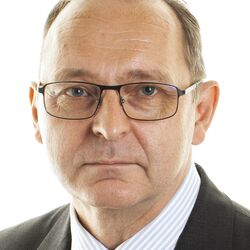
Fernand Didelon graduated from the Ecole des Mines de Nancy where he obtained a MSc in materials and chemical engineering. He started his career in 1991 as a blast furnace process engineer in ArcelorMittal Dunkerque and moved to ArcelorMittal’s Florange plant as head of BF process, then head of BF and utilities production, and later head of sinter plant. During his time at the Florange, he took part in the Ulcos (ultra- low carbon steelmaking) project for implementing a demonstrator top gas recycling furnace at industrial scale. From 2011 to 2021, he occupied various positions, including head of blast furnace, head of steelshop and chief operation officer. In 2021 he joined the green steel team of SMS-Paul Wurth in Luxemburg where he initiated the development of the EASyMelt concept and other decarbonization projects. From March 2024 onward, within Phoenix Technologies SA, a consulting company, he supports steel plants in improving their operational performances, aiding them in selecting the most efficient decarbonization options for sustainable steelmaking. Phoenix Technologies SpeakerCaroline AshleyDirectorSteelWatch
Caroline Ashley is the executive director of SteelWatch, leading a small and growing international team driven by huge ambition: to decarbonize and transform the steel industry for a fair and thriving zero-emissions world. She is an experienced leader, systems-thinker, and change-maker. A socio-economist by background, her career has spanned work in non-profits, policy research, policy making, business innovation, impact investment, consultancy, and community development, in Africa, Asia, Europe and Americas. Her early career in international development focused on equity and sustainability within market systems. Prior to founding SteelWatch, Caroline was economic justice strategic lead at Oxfam GB, challenging powerful players around the world to stretch for greater socio-economic transformation and climate resilience, and global programmes director at Forum for the Future, driving shifts from incremental change to system transformation in energy, food and the role of business in society. SteelWatch SpeakerNicklas MagnussonDecarbonization managerOvako group
Nicklas Magnusson is decarbonization manager at Ovako, a leading European manufacturer of engineering steel. Nicklas was in the construction industry for nearly ten years, holding various positions within the field of sustainable business development, before joining Ovako in 2023. He holds an engineering degree in design and product realisation and a MSc in sustainable technology. Ovako group |
Conference | |
Electrification of Heating – A Path Towards the Decarbonization of SteelmakingToday, decarbonization is on top of every steel company’s agenda. At the same time, energy efficient heating will be crucial in meeting the challenges of a growing global population and combatting climate change, often setting demands on higher operating temperatures and/or reduced cooling. While current heating technology is predominantly gas-fired, electric heating of industrial processes offers unique opportunities to reduce the use of fossil fuels while increasing thermal efficiencies, improving the work environment, and enabling delivery of a fossil-free product. This presentation will address challenges along the entire chain of iron- and steelmaking, from the DRI-process to downstream heating processes. It will show how electric heating solutions can potentially replace gas-heated technologies for various process steps in steelmaking. Examples of heating solutions as well as case stories for the different processing steps within steel production will be shown. Application cases of electrification potential within iron- and steelmaking will include process gas heating, pre-heating and drying of ladles, electric re-heating of billets, continuous annealing processes and roller hearth furnaces. The specific examples will be discussed together with an outlook around the main challenges and opportunities related to electric heating solutions for the steel industry from a global perspective. SpeakerDilip ChandrasekaranSenior Vice President, Director of Business DevelopmentKanthal
With more than 25 years of experience in various R&D-roles, 10 years as head of R&D, and in total 20 years with heating technology company Kanthal, Dilip Chandrasekaran is one of the world’s most knowledgeable experts in the field of resistance materials and industrial heating solutions. He is passionate about materials science, innovation, and customer driven product development – especially around Kanthal’s solutions towards electrification of industries. Kanthal |
Conference | |
Lunch & Networking Break |
Conference | |
Ovako's Sustainability JourneyOvako has a long tradition of process innovations and high steel quality. Sustainability has long been a top priority and today Ovako is a leader in sustainable steel. The journey to this position and the steps that lay ahead will be presented, together with a general outlook on the challenges and opportunities that lie ahead for the steel industry. SpeakerGöran NystromHead, Marketing and TechnologyOvako
Göran Nyström previously served as the executive vice president of marketing and technology at Ovako, now working part-time as a senior advisor. Göran is also a partner of FerroSilva AB, a start-up for producing fossil-free sponge iron energy-efficiently. Göran worked with Sandvik for 24 years in group vice president positions, and holds a MSc in materials physics. Ovako |
Conference | |
An Overview of H2 Green Steel’s Direct Reduction PlantHydrogen steelmaking for a sustainable future; hydrogen-based DRI process overview H2 Green Steel is on a mission to decarbonize hard-to-abate industries, and the steel industry is a prime place to start. Steel production is the source of 7-9% of global CO2 emissions, 5% of CO2 output in the European Union, and 14% of CO2 generated in Sweden, the home country of H2GS AB. Sweden possesses an abundance of natural resources necessary to support green steel production via the direct reduction-electric arc furnace route (DR-EAF). H2 Green Steel is bringing together the technology expertise of Midrex in processing iron ore into steel products, creating green hydrogen with giga-scale electrolysis, and developing a circular supply chain. SpeakerDurgesh GuptaSVP, Head of Iron making TechnologyH2 Green Steel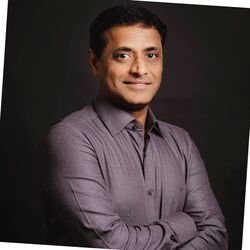
Durgesh Gupta has 26 years of experience heading process, operations, planning, and project management of gas-based direct reduction plants worldwide. From 1997-2003, he was assistant manager (DR process) for Ispat Industries, then moved to Qatar Steel Company to serve as head of process and operations from 2003-2021. Durgesh joined H2 Green Steel in 2021 in his current role. H2 Green Steel |
Conference | |
Panel Discussion: Direct Reduced Iron – a Key Ingredient for Fossil-Free steelmakingChaired by Rutger Gyllenram of Kobolde & Partners SpeakerMarco LapasinVice PresidentDanieli Centro Metallics
Marco has worked with Danieli since 2009. He worked as project director for EPC contracts for direct reduction plant and iron ore beneficiation, as well as other projects for steel manufacturing plants. After an assignment as responsible of execution of construction contracts, he led the new business unit of Danieli Green Metal that has a transversal vocation through Danieli group, with the task of developing new technologies for sustainable steel production. He is now responsible of the product line for direct reduction and iron ore with focus on the process, as well as the commercial side. His previous experience was with engineering companies, working in the fields of chemicals, oil, and gas. He earned a MSc in chemical engineering and started his working career as a process engineer. Danieli Centro Metallics is the business unit of Danieli for direct reduction plants, with the technology of EnergIron, and the upstream processing of iron ore. EnergIron, jointly developed by Danieli and Tenova, is the technology for gas iron ore reduction that is hydrogen ready. Danieli Centro Metallics SpeakerTim PeetersDepartment Manager, Research and Development, IronmakingTata Steel Europe
Tim Peeters obtained a PhD in applied physics at TU Delft, the Netherlands in 1995. He joined Tata Steel in 1999, and has since then fulfilled several roles in R&D, currently as department manager and programme manager for ironmaking, steelmaking, and casting. Decarbonization technology is a major part of his portfolio. Tata Steel Europe SpeakerVincent ChevrierTechnical Sales and MarketingMidrex Technologies, Inc.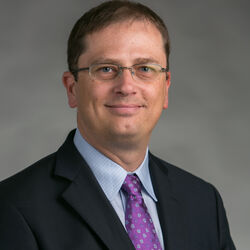
This bio will be updated shortly Midrex Technologies, Inc. SpeakerDurgesh GuptaSVP, Head of Iron making TechnologyH2 Green Steel
Durgesh Gupta has 26 years of experience heading process, operations, planning, and project management of gas-based direct reduction plants worldwide. From 1997-2003, he was assistant manager (DR process) for Ispat Industries, then moved to Qatar Steel Company to serve as head of process and operations from 2003-2021. Durgesh joined H2 Green Steel in 2021 in his current role. H2 Green Steel |
Conference | |
Material Technology that makes a difference for a more sustainable futureAs the steel industry navigates towards a more sustainable future, Alleima stands at the forefront, pioneering the transition towards fossil-free (or more sustainable) steelmaking. In the pursuit of sustainability, Alleima is not only transforming its own operations but also empowers its customers with eco-conscious solutions. Alleima is commited to reduce CO2 emissions, with over a century of reliance on recycled steel and a furnace powered by 100% fossil-free electricity. As a result, Alleima's contribution to Sweden's CO2 emissions stands at a mere ~0.2%. Sustainability is also one of the most important success factors to drive for profitable growth. In this presentation we delve into Alleima's holistic approach to sustainability, examining both internal initiatives to minimize environmental impact and the value our products can bring for customers. We will showcase how Alleima's commitment to sustainability and technological innovation is reshaping the steel industry and propelling us towards a greener, more sustainable future. SpeakerHåkan SundströmHead of Governance and SustainabilityAlleima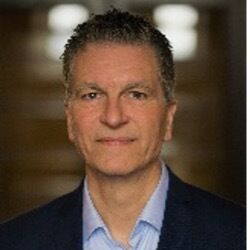
With a background in sustainable practices and managing governance frameworks, Håkan Sundström has been leading various initiatives aimed at enhancing sustainability and environmental health and safety (EHS) within organizations. Prior to his current position, Håkan spent several years at Sandvik Materials Technology (now known as Alleima), where he held various leading positions such as the head of governance and sustainability and head of quality and standardization. He has also held key leadership roles within in Sandvik Mining such as vice president quality, and quality director. Alleima |
Conference | |
Tea & Coffee Break |
Conference | |
Going Fossil-Free Together – a value chain perspectiveIn order to prepare the market and create awareness of the decarbonisation initiatives in a number of industries, SSAB has created a network of fossil-free partners to showcase what can be done with fossil-free steel now, and in the future. SSAB has a long tradition of working together with its customer to improve the performance of the end product. Today the environmental performance is an increasingly important part of the decision criteria for customers and end-users, and how this is promoted will be shown in a number of examples from SSAB customers. SpeakerThomas HörnfeldtVice President, Sustainable BusinessSSAB
Thomas Hörnfeldt is vice president of sustainable business at SSAB. He has an MBA from Uppsala University and an MSc from KTH in Stockholm, as well as vast experience in general management and sales, market intelligence, and sustainability. Thomas has been managing director of Ruukki Sverige, senior vice president of special steels and international sales at Ruukki Metals Ltd, vice president at Atlas Copco Dynapac, and vice president of corporate marketing and sales at steel provider Ovako. His career started at ABB, which he left as vice president in 2004, after almost 13 years of management positions in the metals industry activities. SSAB |
Conference | |
FerroSilva – cost efficient and carbon negative DRIThe FerroSilva process is making the best possible use of residues from forestry and agriculture to produce cost competitive, energy efficient and carbon negative DRI. This will generate valuable products, such as biogenic DRI, biochar and liquefied carbon dioxide for e-fuels and more. SpeakerPeter SamuelssonFounder and Chairman of the BoardFerroSilva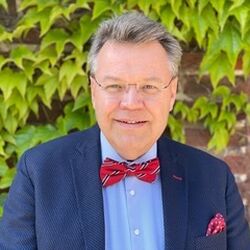
Peter Samuelsson is founder and chairman of the board of FerroSilva AB. Samuelsson has a PhD in metallurgical process science, and is docent in production technology – steel and metals industry, at the Royal Institute of Technology, Stockholm, Sweden. He has some 30 years of experience from both Swedish and international steel and engineering industry. Samuelsson has been chief technology officer and vice president of Sandvik Materials Technology. He previously held the position of senior vice president of research and development at Outokumpu, as well as various business, production, and logistics management positions. FerroSilva |
Conference | |
Closing remarks + end of day 1 conference |
Conference |
| Time | Session title | Stream |
|---|---|---|
Welcome to the Future Steel Forum - Day 2An introduction to the Future Steel Forum, highlighting all the key themes that will be covered over the day two of the conference sessions. SpeakerMatthew MoggridgeEditor, Steel Times InternationalQuartz Business Media
Matthew Moggridge has been editor of Steel Times International since January 2014, having previously edited Aluminium International Today, both published by the UK-based Quartz Business Media. During his time on both titles he has travelled extensively around the world interviewing and writing about leading figures in the metals industry and covering international steel and aluminium conferences. In addition to working as a journalist in many different industrial sectors, he is also the creator and driving force behind the development of the Future Steel Forum. Matthew’s career as a business journalist has spanned many leading titles covering other industrial sectors including food processing, foodservice, foreign direct investment, bulk handling and transportation and computers. Quartz Business Media |
Conference | |
Tata Steel’s Journey Towards Hydrogen-based and Circular SteelmakingTata Steel in The Netherlands is aiming to reduce CO2 emissions by 5Mt/yr in 2030, and to become fully carbon neutral in 2045. To achieve this ambitious goal, multiple steps have to be taken in this transition journey, phasing out traditional blast furnace technology. Next to the existing blast furnace – basic oxygen steelmaking route, an electric arc furnace steelmaking route will be integrated into the production process. This will involve a higher amount of scrap recycling, as well as the use of direct reduced iron. In addition to the challenge of reducing CO2 emissions, a focal point is the improved environmental footprint of new technology. SpeakerTim PeetersDepartment Manager, Research and Development, IronmakingTata Steel Europe
Tim Peeters obtained a PhD in applied physics at TU Delft, the Netherlands in 1995. He joined Tata Steel in 1999, and has since then fulfilled several roles in R&D, currently as department manager and programme manager for ironmaking, steelmaking, and casting. Decarbonization technology is a major part of his portfolio. Tata Steel Europe |
Conference | |
Low-Carbon Steel Production: is Europe setting the right conditions to remain a significant producer?Steel is an internationally traded commodity, as will soon be the case for green steel. The competitiveness to decarbonize steel will remain a key attribute to ensure it remains the material of choice. Most EU players are intending to transform their production processes, massively supported by their respective member states, moving production from the classical BF-BOF routes to DRI–EAF routes. But are requisites in terms of availability, embedded CO2, and pricing of new raw materials and new low-carbon energies being met to ensure a successful production in EU countries? Is the regulatory framework ensuring that EU producers can effectively operate on a market which offers a fair level playing field? And, how is ArcelorMittal moving in Europe in this uncertain context? SpeakerStéphane TondoTechnical Head for Governmental Affairs and Climate change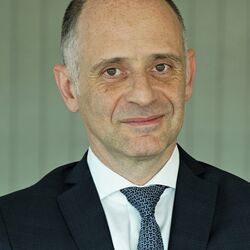
Stéphane Tondo is currently head of climate change and governmental affairs at ArcelorMittal, and in that function, he contributes to the decarbonization roadmap of European entities and its financing. Stéphane joined Sollac, a former company of ArcelorMittal in the automotive sales division in 1998 where he held several positions, from market development engineer, through to key accounts manager, and finally heading the automotive sales area. Since 2013, he has been chief marketing officer in charge of packaging, oil and gas, and electrical steel segments within ArcelorMittal Europe Flat Products. Additionally, in March 2020, he took the role of chief executive officer of ArcelorMittal Avelino and Canossa in Italy. Stéphane holds a degree as a sales engineer from the ESIDEC business school in Metz, France. |
Conference | |
Europe's Green Transition: what are the perspectives and opportunities for energy-intensive industries?The Russian war against the Ukraine has a major impact on the European economy. The sharply declined Russian natural gas supplies to Europe caused a gas crisis with sky rocketing gas prices, which in turn triggered record prices and high volatility for electricity. Subsequently, prices for goods and commodities rose sharply, trade unions demanded massive wage increases due to the massive rise in living costs- the wage price spiral has started. Even if prices for gas and electricity have fallen again since the price shock in 2022, industrial production, in particular the production of the energy intensive industry in Europe, has not been able to recover since then. SpeakerDr. Roman StiftnerManaging DirectorAustrian Non-Ferrous Metals Federation and the Austrian Mining & Steel Association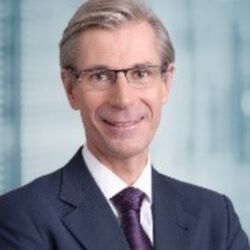
Dr Roman Stiftner, CSE, is managing director of the Austrian Non-Ferrous Metals Federation and the Austrian Mining and Steel Association, as well as director-general of EUMICON. He is president of the Austrian Logistic Association (BVL), president of the European Shippers’ Council (ESC), vice president of Euromines and the European Logistics Association (ELA), and a member of the executive committee of European Aluminium and Eurometaux. Roman was CEO of the logistics automation company Dematic GmbH and senior vice president of Siemens AG Austria. He represented transport, infrastructure, environmental and energy affairs as a member of the Vienna State Parliament from 2005 to 2015. Roman studied at the Technical University Vienna and at the Vienna University of Economics and Business and graduated in 1994. He holds an academic doctorate degree from the Technical University Vienna. Since 2018 he has been a Certified Supervisory Expert (CSE) and is a lecturer at the University of Applied Science in Vienna. Austrian Non-Ferrous Metals Federation and the Austrian Mining & Steel Association |
Conference | |
Climate Change Resilience – waterThe steel industry plays a key role in the development and prosperity of any society. A salient feature of this industry is high-CAPEX intensity and assets which are designed for relatively long life. Like any other business, the industry needs to be constantly vigilant and protect itself against risks, be it investment related or natural forces. Once established, a steelmaking site doesn’t have much flexibility in relocating if there are extraordinary changes in local circumstances – it can only work towards better resilience. This research analyses two important risks: sea-level rise and water scarcity to the steelmaking sites. These risks are attracting increasing interest in public debate and more importantly by investors who naturally like protecting their investments. The more robust an industry is, the more attractive it is for the investment. The insurance companies interestingly are both investors and insurers of steel industry assets. Their business model can probably be defined as ‘hope for the best but prepare for the worst’. This maxim is equally applicable for the steel industry as an advice in preparing itself against the two risks presented in the report. The steelmaking sites likely to be affected by the two risks are significant in number and distributed around the world. In order to prepare for the risks or develop ‘climate-change resilience’, the development, deployment, and financing is largely a matter of partnering with local businesses and regulatory authorities. The sites need to have effective and robust ‘water stewardship’ which takes into account available resources and strategies for overcoming shortfalls by building reserves. Retreat away from the current location might not be viable for the costal sites which are at lower elevations. However, there can be a number of innovative solutions such as flood-proof structures, restoration of nature e.g. mangroves or even building sea-walls. SpeakerRizwan JanjuaHead of technologyWorld Steel Association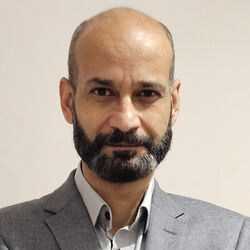
Dr. Rizwan Janjua holds PhD in material sciences from the TU Bergakademie Freiberg, Germany. He joined the steel industry in 2002 and has been involved in process technology, energy efficiency, process yield and asset reliability. He is head of technology at the World Steel Association and is responsible for leading worldsteel’s activities in the field of technology, energy efficiency, and CO2 breakthrough. He is secretary to the worldsteel Technology Committee (TECO), CO2 Breakthrough Programme and leads the ‘StepUp’ programme which is aimed at improvements in mill operations to efficiency levels commensurate with the steel industry’s top performers for emissions and energy intensity using existing proven installed technology and best practices. He led the flagship project ‘Premature Wear of Copper Staves in Blast Furnaces’, investigating ways of extending the campaign-life of blast furnaces by minimising stave wear – the outcomes are highly acclaimed and frequently cited in publications. He has represented the steel industry in technical discussions on energy and climate change at IEA, IRENA and OECD and reviewed several technical reports. World Steel Association |
Conference | |
Tea & Coffee Break |
Conference | |
The transformation of steel: blockers, builders and implicationsThis session will explore the inevitable transition away from coal as steel decarbonizes, and the implications in the near and far future. Like thermal coal, the breadth and pace of change will ripple through the geography of production, the economics of green steel, and the stories we tell about its place in our civilisation. Caroline will explore the challenges and opportunities for companies embracing this transformation, the risks looming over those that block it, and why transformational action, not tinkering, will forge the true future of steel. SpeakerCaroline AshleyDirectorSteelWatch
Caroline Ashley is the executive director of SteelWatch, leading a small and growing international team driven by huge ambition: to decarbonize and transform the steel industry for a fair and thriving zero-emissions world. She is an experienced leader, systems-thinker, and change-maker. A socio-economist by background, her career has spanned work in non-profits, policy research, policy making, business innovation, impact investment, consultancy, and community development, in Africa, Asia, Europe and Americas. Her early career in international development focused on equity and sustainability within market systems. Prior to founding SteelWatch, Caroline was economic justice strategic lead at Oxfam GB, challenging powerful players around the world to stretch for greater socio-economic transformation and climate resilience, and global programmes director at Forum for the Future, driving shifts from incremental change to system transformation in energy, food and the role of business in society. SteelWatch |
Conference | |
Is it time for a better scrap upgrade and mid-size DR plants to replace old BF plants?When blast furnace integrated plants turn to the EAF process line it may be enough to have smaller DR-plants and a better scrap upgrade to secure the iron supply. The alternative may be to have bigger DR-plants to provide HBI to several plants with less need for scrap upgrade. How will available resources and new local needs affect the design of the plants that will replace old integrated plants. SpeakerRutger GyllenramCEO and FounderKobolde & Partners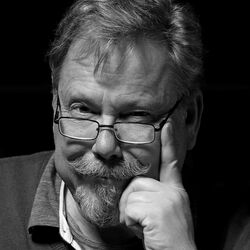
Rutger Gyllenram is a Swedish metallurgist and entrepreneur. He has an MSc in process metallurgy and materials science and a licentiate degree (Dr-ing) in metal production technology from the Royal Institute of Technology, KTH, in Stockholm. He is the founder and CEO of Kobolde & Partners AB, working with raw material and process assessment, which is crucial for decarbonization in the steel industry. Kobolde & Partners |
Conference | |
Fifty Shades of Green Steel – Cyclosteel’s green steel production solutionFor at least 10 years, there have been very significant R&D driven developments across Europe to decarbonize and make technologies greener. Nevertheless, it is very sad to see that many of the producers now define themselves as green steel producers only because they use electric furnaces. This process is harmful, unfortunately making the green steel designation a marketing label instead of a specific added value. This can happen because there is still no clear definition of green steel; I will go further, there is no clear boundary as to who, on what technological background, can call their steel product green steel. Cyclosteel is focusing on the following areas when planning green steel production:
SpeakerTibor SzokeCTOCyclosteel
Tibor Szoke graduated as a metallurgical engineer in 1996 and has an absolutory PhD on the economics of metallurgical regions. He has been head of engineering at CEMI consulting company for 15 years. He is currently chief technology officer of Cyclosteel and is focused on the total green transformation of technology. Cyclosteel |
Conference | |
Lunch and Networking Break |
Conference | |
Intelligent Steel Production through Digital TransformationJFE Steel is promoting digital transformation to stabilize production, improve productivity, and decarbonize. The company is aiming to realize future intelligent steel mills by developing digital transformation. The utilization of cyber-physical systems and robotics has become an element technology of digital transformation. In this presentation, three applications are explained:
All applications are developed in-house by research engineers at JFE Steel. SpeakerTakahiro KoshiharaGeneral managerJFE Steel
Takahiro Koshihara worked at JFE Steel's Steel Research Laboratory from 1997 to 2024, where he mainly worked on the research and development of temperature measurement and surface inspection equipment using cameras and magnetism in steel mills. Currently, he is involved in the development of data science technology in the cyber physical systems research and development department. He graduated from the University of Tokyo and holds a MSc in engineering. JFE Steel |
Conference | |
Improving Barrel Reclaimer Operation Efficiency Through Autonomous OperationTSJ sinter plant is one of the largest producers (9Mt/yr) of sinter in India. Sinter is the prepared burden for blast furnaces, which improves blast furnace productivity and coke rate. Raw materials used in sinter making are basemix, coke breeze, limestone, and calcined lime. Basemix (BM) is a homogenous mixture of iron ore fines, limestone, dolomite, pyroxenite, coke breeze, and reverts, which is made layer by layer via the pile making process. The barrel reclaimer (BR) is used to reclaim BM from the pile and dispatch it to the sinter plant. This was a manually operated machine which had to be stopped during shift changeovers and periods of heavy rain as the operator then faced difficulty. For the first time ever in India, we installed a new remote operation system in the BR and connected it with fibre optics to operate it from ISPOC (Integrated Sinter Plant Operation Centre) to increase the running hours of the BR. SpeakerBikash Kumar ChatterjeeHead of Operation, Sinter PlantTata Steel
Bikash is a metallurgical engineer from NIT Durgapur, with 18 years of experience in iron ore sintering and pelletization, operation, design and engineering. Bikash specializes in the sintering process, controlling stack emissions, pelletizing process, drying and grinding process, and has a wide understanding of plant machinery. He has worked with Tata Steel Limited since 2010 as head of operation, sinter plant. Tata Steel SpeakerVikasHead Client Partner, Iron makingTata Steel
Vikas is an electrical and electronics engineer from BIT Sindri, with an MBA from IMT Gaziabad. Vikas has 18 years of experience in the IT sector of SAP. He has worked for Tata Steel since 2005 as a head client partner in iron making, driving digital transformation in iron making. Tata Steel |
Conference | |
Discussion Panel: Artificial Intelligence and steelmaking: a force for good?SpeakerKurt HerzogHead of Industry 4.0Primetals Technologies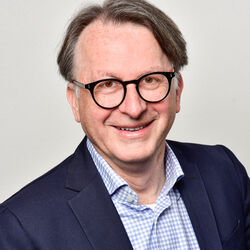
Kurt Herzog completed his master’s degree in industrial automation at the Technical University of Vienna and his MBA at the Linz Management Academy. In 1997, Kurt began working for VAI, a predecessor company of Primetals Technologies, in the area of process automation, and held several management functions in electronics and automation as well as in engineering. Since 2016, he has been responsible for the Industry 4.0 portfolio of Primetals Technologies. Primetals Technologies SpeakerDr. Falk-Florian HenrichFounder and CEOSmart Steel Technologies
Dr. Falk-Florian Henrich is the founder and CEO of Smart Steel Technologies. The company offers AI-based software products to optimize steel production. Prior to founding Smart Steel Technologies, Dr. Henrich built the high-tech company CeleraOne (2011-2018), and established it as the market leader in the paid content sector and then sold it to Axel Springer SE. Dr. Henrich holds a PhD in mathematics and contributed substantial research to the theory of loop spaces of Riemannian manifolds and artificial intelligence. Smart Steel Technologies SpeakerDr. Thiago Turchetti MaiaExecutive Vice President for Center of Excellence Automation, Digital, and Service SolutionsSMS Group
Dr. Thiago Turchetti Maia is the executive vice president for SMS digital’s Center of Excellence. He has 20+ years of experience in leading technology companies focused on industrial digitalization. He founded Vetta and Viridis, two companies later incorporated by the SMS group. He has led software industry associations and served on different supervisory boards. He holds a PhD and an MSc in Electrical Engineering, a BSc in computer science, and an MBA in finance. SMS Group SpeakerGiovanni BavestrelliData Science DirectorTenova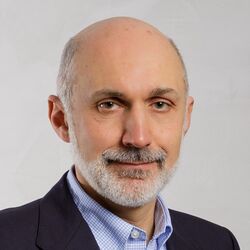
Giovanni Bavestrelli graduated from the Politecnico di Milano, Italy, with a master’s degree in software engineering, after attending high school in Johannesburg, South Africa, for five years. He joined Pomini Tenova in 1994, working on roll grinder automation, developing and commissioning software systems for running roll shops in steel plants. He later joined Unisys Corporation in the year 2000, leading the development team for the Hermes editorial system. He went back to Pomini Tenova in 2004 as software engineering director and has since worked for Pomini Tenova, leading the software development team. In 2016 he contributed to Tenova’s Digital Transformation initiative and later joined the new Tenova Digital Team as director. He currently holds the position of Data Science Director, focusing on artificial intelligence applications, and working closely with all of Tenova’s business units. Tenova SpeakerEnrico PlazzognaExecutive Vice President (Sales)Danieli Automation
Born in Udine and living there today, Enrico Plazzogna graduated in electronic engineering, specialising in industrial controls at Padova University, winning a scholarship from Consorzio Padova Ricerche for a graduation thesis focused on robotic applications. He joined Danieli as a proposal engineer in 1994 and then became area manager for Europe, then for Middle East and for Eastern Europe and Russia. He was then appointed executive manager (sales) for minimills and turnkey plants. Today he is executive vice president of sales, and a member of the board of Danieli Automation. Danieli Automation |
Conference | |
Tea & Coffee Break |
Conference | |
Real Time Carbon Footprint Tracking Through Enhanced MES to Drive Green Steel ProductionAs part of their own decarbonization process, steel customers are increasingly asking for detailed CO2 footprints of individual products and pieces they buy. For this, correspondingly transparent CO2 tracking and reporting during steel production is necessary and will become the norm. In many industries, reporting CO2 emissions is still high level and often based on yearly production tonnage and related average CO2 equivalents for different processes and plant areas. This paper will highlight a Product Carbon Footprint (PCF) approach implemented as part of the quality management within a steel manufacturing execution system based on process snapshots from all production steps. It introduces hierarchically defined CO2 equivalent emission factors on levels of production area, production line and production step. Thus, all relevant CO2 equivalent emissionscan be calculated and tracked in real time on piece and product level along the entire chain of steel production steps. The results are stored on the related nodes of the material genealogy. Furthermore, PCF tracking and forecasting provide essential input foroptimized production planning, scheduling, and execution with a weighted trade-off between economic and ecological KPIs.Finally, products with labels from certified PCF tracking methodologies allow establishing green lead markets, fostering anincrease in demands for green steel with improved accountability, transparency and trust from investors, government and final customers. SpeakerDipl. Betriebswirt Marc SchwarzerConsultantPSI Metals
Marc Schwarzer, graduated as with an MBA in business administration with a focus on informatics and logistics at the Julius-Maximilians University of Würzburg. During his time at university, he worked for two tears on a part-time basis at Frankonia Jagd (part of Otto AG), and ran his own IT company for web solutions and custom-built consumer computers. In 2007, he joined PSI Metals as a junior consultant in the field of production management solutions for the metals industry. Over the years, he progressed to roles such as senior consultant, project manager and technical sales. His expertise in metals processes, supply chain planning, solution design and project management is highly sought after. After more than 15 years of experience in the fields of production management solutions encompassing supply chain management and planning, product design, quality management, production execution, logistics and untegration with external systems, he has become a recognized expert in these areas. PSI Metals |
Conference | |
Journey to Intelligent Process Management: Case study of Fives and Arvedi ASTIn the fast-paced steel production world, staying competitive is an ongoing challenge. Arvedi AST (Acciai Speciali Terni), a leading European stainless steelmaker, has chosen Fives to take a digital step forward to transform their steel process management. Eyeron®, an intelligent quality management system was installed across the entire integrated plant of Arvedi AST with the aim of streamlining the production process and taking quality management to a higher level. While implementing smart process rules and analyzing offline accumulated database, significant process improvements and savings were realized. Immediate coils quality grading helped to improve cut management, while dividing coils into head, body, and tail with different treatments regarding their process histories and orders. Moreover, outstanding process improvements were made while covering different bottleneck topics along the whole process. SpeakerAlexandre GaucheSteel Digital Factory DirectorFives Group
Alexandre Gauche has been working at Fives since 2017, starting as a digital and innovation director in the energy division, then becoming a service and digital director in the steel and glass division. He has a master’s degree in engineering, science and technology from École Polytechnique, France and a master’s degree in science and executive engineering from École Nationale Supérieure des Mines de Paris, France. Fives Group |
Conference | |
Digitalization is a Key Enabler for Green Steel ProductionIn pursuit of carbon neutrality and amidst rising energy costs, the steel industry is undergoing one of its biggest transformations in history. This is a big challenge for established steel producers as well as for new players on the steel market that focus on green steel production. Luckily, various digitalization technologies became available and evolved that are necessary for steel producers to master this transformation. Data-driven models, for example, gain insight of energy consumptions and help to optimize production. AI-based digital assistants facilitate the operator’s life and, together with smart operational concepts, enable production in an autonomous plant environment. This is particularly important in case of limited access to skilled personnel such as operators, for example if experienced people retire or new plants are erected. SpeakerAlexander ThekaleTechnology Officer, Electrics and AutomationPrimetals TechnologiesAlexander Thekale is the technology officer, electrics and automation, at Primetals Technologies. He previously held the position of innovation manager, electrics and automation, and head of digital solutions for downstream technology at Primetals. He holds a PhD in mathematics, and a diploma in applied mathematics, both from the University of Erlangen-Nuremberg. Primetals Technologies |
Conference | |
A Co-Pilot for SteelmakingA modern steel plant requires very fast decision making, also given the innovation in the production process, moving towards endless casting and rolling. Therefore, the big amount of data available must be transformed into information. Such information is shared to operators and plant managers quickly and in efficient way. DANIELI has designed the COPILOT for steelmaking, simplifying operators’ actions and decisions, taking advantage of Generative AI, Machine Learning, Digital Twins and Augmented Reality. We are moving towards the autonomous and intelligent plant. SpeakerEnrico PlazzognaExecutive Vice President (Sales)Danieli Automation
Born in Udine and living there today, Enrico Plazzogna graduated in electronic engineering, specialising in industrial controls at Padova University, winning a scholarship from Consorzio Padova Ricerche for a graduation thesis focused on robotic applications. He joined Danieli as a proposal engineer in 1994 and then became area manager for Europe, then for Middle East and for Eastern Europe and Russia. He was then appointed executive manager (sales) for minimills and turnkey plants. Today he is executive vice president of sales, and a member of the board of Danieli Automation. Danieli Automation |
Conference | |
Closing remarks + end of day 2 conference |
Conference |
JOIN OUR MAILING LIST
Be the first to hear about exhibitors, speakers and what's on at our upcoming events.